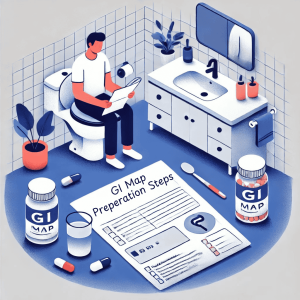There are a few important steps to prepare after you order your GI Map Stool Test. This guide covers how medications, supplements, and certain health conditions may influence your results. Your test kit will include detailed collection instructions, but be sure to consult your healthcare provider for any personalized preparation guidelines based on your specific health needs.
Table of Contents: GI Map Test Preparation FAQ
- Should I Adjust My Medications Before a GI Map Stool Test?

- How Do Antibiotics Impact My GI Map Results?
- Do I Need to Stop Taking Supplements Before a GI Map Test?
- Does Menstruation Affect Test Accuracy?
- Will a Recent Colonoscopy Affect My GI Map Test?
- Do Oral Steroids Influence the Microbiome?
- Should I Stop Antimicrobial Agents Before Testing?
- Can I Take a GI Map Test After Surgery?
Should I Adjust My Medications Before a GI Map Stool Test?
Most prescription medications should be continued as directed, but some may influence your results. Always check with your healthcare provider before making any changes. Medications that can impact gut health or specific markers include:
- Antibiotics (e.g., amoxicillin, ciprofloxacin)
- Proton pump inhibitors (PPIs) and H2 blockers (e.g., omeprazole, ranitidine)
- Oral steroids (e.g., prednisone, dexamethasone)
- Biologic agents (e.g., Humira, Remicade)
- Anti-inflammatory drugs (NSAIDs, aspirin)
- Laxatives and stool softeners
- Medications for bowel motility (e.g., metoclopramide)
- Blood thinners (e.g., warfarin, aspirin)
- Diabetes medications (e.g., metformin)
How Do Antibiotics Impact My Results?
Antibiotics can significantly alter your gut bacteria, affecting test accuracy. If possible, wait 30 to 60 days after finishing an antibiotic course before taking the test to allow your microbiome to stabilize.
Do I Need to Prepare by Stopping Supplements Before Collection?
Many supplements are fine to continue, but your provider may recommend pausing certain ones for a clearer baseline. Key considerations include:
Non-Prescription Antimicrobials
Herbal and natural antimicrobials, such as oregano oil, berberine, and grapefruit seed extract, can influence bacterial levels. If a true baseline is needed, discontinue them 30 to 60 days before testing.
Enzymes
Digestive enzymes won’t affect elastase-1 levels (pancrease function markers), but supplements containing lipase or ox bile may reduce steatocrit values, which measure fat content in stool. Consider stopping using these at least three days before the test if assessing fat absorption.
Probiotics
Probiotics, including strains like Lactobacillus and Bifidobacterium, can influence test results. If testing your natural gut flora, stop taking probiotics two weeks before the test. If evaluating their effects, continue their use.
Biofilm Disruptors
Biofilm disruptors, such as NAC (N-acetylcysteine), serrapeptase, and EDTA, are sometimes used before stool tests to expose hidden bacteria. This step is optional and should be discussed with your provider.
Does Menstruation Affect Test Accuracy?
Yes. Menstrual blood can cause false positives in fecal immunochemical tests (FIT), which check for hidden blood in stool. Avoid collecting your sample three days before or after your period.
Will a Recent Colonoscopy Affect My GI Map Test?
Yes, a colonoscopy can temporarily disrupt gut bacteria. For the most accurate results, wait at least one week after the procedure before collecting your stool sample.
Do Oral Steroids Influence the Microbiome?
Oral steroids, such as prednisone, can alter gut flora. Continue taking them as prescribed unless your doctor advises otherwise.
How Should I Prepare for the GI Map Test If I’m Taking Antimicrobial Agents?
If you are using antimicrobial supplements or medications, waiting 30 to 60 days before testing can provide a more accurate picture of your gut health.
Can I Take The Test After Surgery?
Yes, post-surgical patients can take the test. However, recent procedures may temporarily elevate inflammation markers like calprotectin. If you’ve had surgery, discuss timing with your doctor to avoid misleading results.


